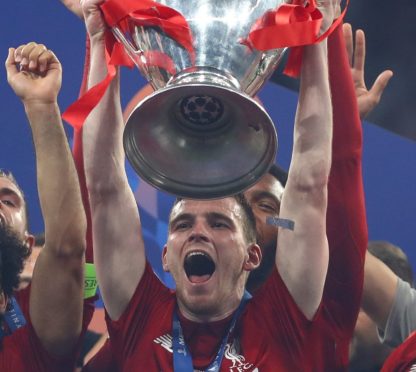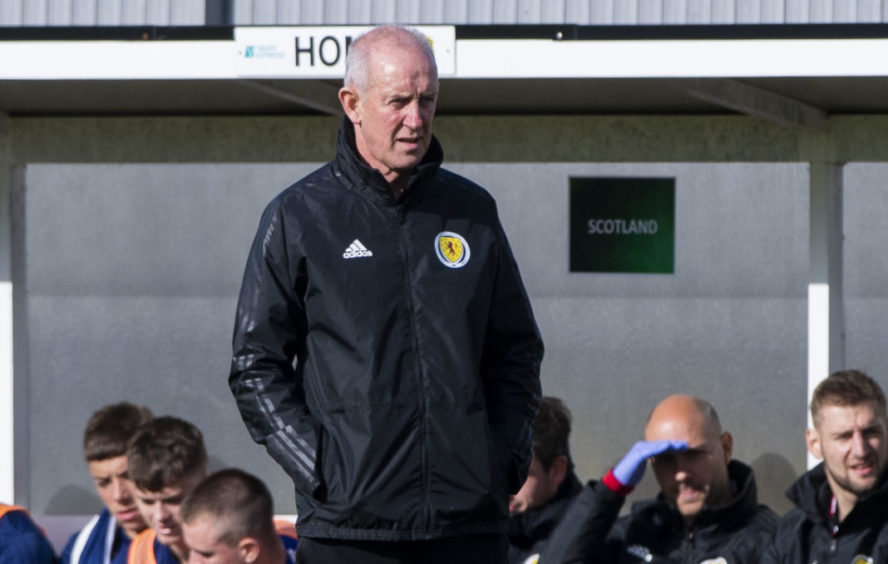
Billy Stark admits that, with no return to competitive football in sight, he fears for the future of the country’s brightest young talents.
The Scotland Under-19 coach is not concerned that teenagers tipped to one day grace the Scottish and English top flights will suddenly lose their natural ability.
Rather, he worries the psychological challenge of getting through what is a prolonged and unprecedented break from the game could prove too much for some.
“I think everyone will have heard coaches say that it is not the best kids who make it as much as the ones with the best attitude,” said Stark, who six months ago led his side to a startling win over Germany at Firhill.
“Football is a tough industry. It throws up challenge after challenge, and to deal with them all successfully, you need to have good mental strength.
“Here in Scotland, we probably have more than our share of those types.
“We get plenty of kids with good attitudes, and we help develop them into strong-willed players.
“You can’t get a better example of someone who has risen to meet challenges than Andy Robertson.
“To go from playing in the bottom tier of Scottish football with Queen’s Park to representing Liverpool in the Champions League Final is a fairytale.
“And we have other guys in the national teams, at all levels, who have overcome injury and career setbacks to be one of the small group of players who get the chance to represent their country.
“What worries me is that the situation we are experiencing just now is unprecedented.”
Certainly 63-year-old Stark has never seen anything like it since signing on for St Mirren as a fresh-faced teenager in 1974 where he became one of Alex Ferguson’s protégés.
Spells, and medals, at Aberdeen, Celtic, Kilmarnock and Hamilton Accies followed before he embarked on a successful coaching career at club and international level.
Indeed, having won his one and only game in charge of the full Scotland team – a 2-1 win in a Luxembourg friendly in 2012 after standing in as caretaker after Craig Levein’s departure – he could argue to be our most-successful national boss ever!
All of his experiences have made Stark a deep thinker on the game, and what we’re going through right now concerns him.
“None of the current generation have ever had a break from football thrust upon them in this way,” he continued.
“I have heard people wonder aloud what kind of shape players from their favourite teams might be in when games finally get going again.
“These are senior players they’re talking about, guys who have the backing and support of their clubs to fall back on.
“But how does a 15 or 16-year-old cope with it?
“It is true, for the main part anyway, that these are kids who are pretty much going to have a ball glued to their feet.
“Yet you have to remember not everyone is lucky enough to have a garden.
“Back in my day – which is more than a few years ago, to be fair – we would be using the lobby walls for practice.
“Normally, if they couldn’t train at their clubs, you could say they could just go down to the local park and have a kick-about.
“But right now, that would fall outwith government guidelines.
“So there are cases where we are looking at a serious interruption to young players’ careers which haven’t even really got properly started.
“How do they cope with that? How do they cope with that just now, and how do they cope with that when it comes to going back to their old routine?
“The best adjusted, the ones in the most-suitable circumstances, the ones who are most driven – all of these kids should be fine.
“It is the other ones I would worry for.”
Stark’s use of the word “routine” is key as the sudden removal of normal life lies at the heart of his concerns.
“Coronavirus has been, and is, a huge challenge for everybody,” said the Glaswegian.
“We have all had our lives turned upside down, and shoogled about.
“In some cases, it has been enormously more disruptive and had a much bigger impact than others.
“The NHS, social carers and all essential workers are obviously right in the front line of things.
“However, even for those of us who are at home on furlough, this is a mental test.
“How do you fill your time? Can you manage your moods? How are you going to cope with being separated from friends and family members?
“I’d argue that it is exceptionally tough when you are a teenager, full of energy and desire to make your way in the world.
“Being a young footballer is very tough under normal circumstances.
“There are only so many who are going to make it as a professional, but the kids do operate within a framework which shapes their development.
“If you’re at one of the SFA’s Performance Schools, then you will get training with us during the day and then more with your club at night.
“Throw in two or three games a week and that is a packed schedule to follow, and one which naturally focuses players.
“There is not much room for manoeuvre there.
“That has all gone now and gone for, I’d guess, three months minimum.
“You add it all up, and it is a lot of fitness work and a lot of technical practice.
“As I say, I don’t doubt the young players’ ability to catch up, if need be, on conditioning work.
“I would also be confident that their skill levels would be fine, at least after a little while.
“My fear is that some might lose the drive to carve out a career as a footballer that you need to be a success.
“I would use the analogy of joggers, who maybe give up when it starts getting cold again, and would maybe no longer fancy putting themselves back into such a demanding schedule again.
“If that was to happen with any young player, it would be a real shame for the individuals concerned, who have put the years of effort into their football.
“It would also be detrimental to Scotland as a footballing nation.
“We are a small country and, as such, we need to be making the very most of the talent which is at our disposal.
“That especially holds true with the individuals we are talking about here. They are the players who the clubs have picked up with a view to having them in their first-teams in a few years’ time.
“I am not talking about the Billy Gilmours of this world.
“He is already far enough down the line with Chelsea and with ourselves at national level.
“I am talking about the ones with the potential to become a Billy Gilmour.
“All Scottish fans want to see these exciting talents make it successfully through the ranks, and we coaches are no different.
“We were thrilled by the result and the performance in the win against Germany last October, and you could see how happy the fans were too.
“With all the hard work and investment that has gone in at all age levels of our game, there is no reason to think we can’t enjoy more of those sort of nights against other top countries in the future.
“Right now, though, we simply don’t know what the future holds.
“No one does.”

Enjoy the convenience of having The Sunday Post delivered as a digital ePaper straight to your smartphone, tablet or computer.
Subscribe for only £5.49 a month and enjoy all the benefits of the printed paper as a digital replica.
Subscribe © Bill Murray / SNS Group / SFA
© Bill Murray / SNS Group / SFA